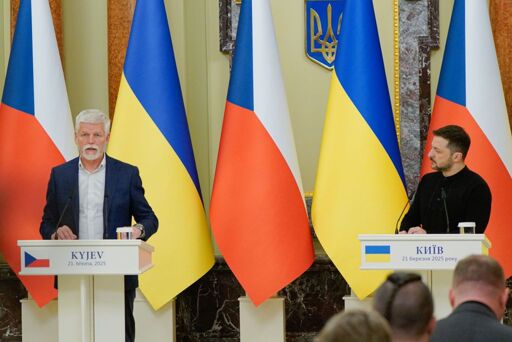With Czechia’s new government coalition likely to take office in the coming weeks, the question of the country’s landmark ammunition initiative for Kyiv remains unanswered.
Populist billionaire Andrej Babis, whose ANO party ousted the pro-Ukraine cabinet of Prime Minister Petr Fiala in the October parliamentary election, has lambasted the project as overpriced and non-transparent.
Neither Prague nor its partners, however, have put forward a definite plan on keeping the scheme operational in its current form should the new government abandon it.
Czech officials say Babis’s suggestion to have NATO take over it is not feasible, and that simply passing it over to another country would also be a tall feat.
No easy solution
The Czech ammunition initiative, hailed by its proponents as Prague’s greatest achievement on the international stage, was launched in early 2024 amid Ukraine’s severe ammunition shortage.
Czechia said it had delivered 1.5 million shells, including the sorely needed 155 mm and 122 mm calibers, under the initiative last year, and an additional 1.3 million by October 2025.
Following the defeat of the Czech governing coalition in the October parliamentary election, European partners have grown anxious about the prospect of the victorious opposition scrapping it.
Babis has been ambiguous about the project’s future. While initially vowing to cancel it altogether if elected, his party later toned down its rhetoric, calling instead for a review or for the initiative to be passed under NATO’s wing.
But the outgoing Czech Defense Ministry has already ruled out the option, saying that “NATO does not and cannot buy materiel for Ukraine” and materiel purchases and donations are “always carried out by individual members.”
Media and observers have also speculated about the possibility of passing the initiative over to another member state.
Czech news outlet Seznam Zpravy reported that, according to its sources, Estonia is being discussed as a possible candidate. However, Tallinn has ruled out such an option when asked by the Kyiv Independent.
The Estonian Foreign Ministry said that “no such discussions (are) taking place,” and the country’s Defense Ministry added that Estonia has no plans to take the lead in the initiative.
“I do not comment on the content of diplomatic talks,” Czech Foreign Ministry spokesperson Daniel Drake told the Kyiv Independent. “We rule out that the Czech ambassador to Estonia conducted any such talks.”
Tomas Kopecny, a Czech official who was one of the initiative’s architects, confirmed that talks with partners about the project’s future have been underway but denied that transferring it to another country was discussed.
While the Estonian government pushed for its own ammunition schemes earlier in the war, Kopecny said they turned out to be less time-efficient than the Czech project, which relied on private companies to purchase the shells directly.
Czechia has been leveraging its extensive contacts in the global arms market to oversee the initiative, gathering approximately $4.5 billion from 15 donor countries.
Kopecny clarified that Prague initiated discussions about the initiative’s future with foreign partners in early 2025, when ANO began openly discussing the cancellation of the scheme.
“We have been… explaining how likely such a scenario is, what it would mean for the operation, and discussing how to keep the supply mechanism running,” if the Czech government is no longer interested, the official said, without providing details.
This means that the initiative’s future remains shrouded in uncertainty, much like the entire Ukraine policy of the incoming Czech government.
Read also: Analysis: With all eyes on Pokrovsk, Russia drives forward in Zaporizhzhia Oblast
Kyiv awaits Prague’s next move
While the outgoing Czech government made its staunchly pro-Western and pro-Kyiv policy one of its key pillars, Babis has been dodgy on the topic of Ukraine.
The government program policy of ANO and its junior coalition partners — the far-right Freedom and Direct Democracy (SPD) party and the anti-environmentalist Motorists — barely touches on the war and makes no mention of continued Czech support.
Babis said his cabinet would no longer allocate defense aid to Ukraine from the state budget, noting that Kyiv should receive support through the EU instead.
His rhetoric has echoed those of Budapest and Washington, urging a diplomatic resolution of the war.
As they seek to assess the direction of the incoming Czech government, Ukrainian officials have struck a cautious tone — thanking Prague for its past support and awaiting next steps.
When SPD leader Tomio Okamura, the new speaker of the Czech parliament, removed a Ukrainian flag from the legislature’s building, his Ukrainian counterpart, Ruslan Stefanchuk, reacted by flying the Czech flag in the Verkhovna Rada.
There has been little talk about the Czech initiative’s future on the Ukrainian side.
Speaking to the Kyiv Independent in October, lawmaker Oleksandr Merezhko lauded Czechia’s initiative to gather artillery ammunition for Ukraine “when we needed it the most.”
Both Ukraine and its European partners have ramped up artillery production in recent years, with Kyiv’s priorities currently focused on securing additional air defenses in the face of Russian aerial attacks.
Merezhko, who heads the Ukrainian parliament’s foreign affairs committee, said that while the ammunition initiative has been “extremely important” for Kyiv, it would not be a critical loss now if it is scrapped.
The initiative, crucial a year ago, is becoming less important by the day due to one simple reason — the war has changed.
Read also: How a trio of power brokers turned Putin’s US strategy into a quiet turf war
Note from the author:
Hi, this is Martin Fornusek.
I hope you enjoyed this article. In our team, we believe fact-based and truthful reporting should be available to all — that’s why we don’t use any paywall.
If you’d like to help us provide you with more in-depth coverage of Ukraine’s struggle against Russian aggression, European politics, and other topics, please consider joining the Kyiv Independent community.
From The Kyiv Independent - News from Ukraine, Eastern Europe via this RSS feed


